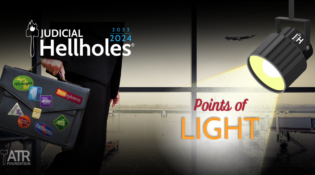No rational observer would suggest for a moment that citing the U.S. Appeals Court for the Ninth Circuit on this report’s Watch List will in way prompt it to moderate its oft-overturned ways. (Hawthorne effect be damned.) But two very disappointing decisions this year expanding liability for innovative companies demand attention.

U.S. COURT OF APPEALS FOR THE NINTH CIRCUIT
EXPERT TESTIMONY
In Wendell v. GlaxoSmithKline the Ninth Circuit in June of 2017 overturned the U.S. District Court for the Northern District of California’s exclusion of an expert witness under Daubert. The lower court found several issues with the expert’s testimony, including that it seemed litigation driven, was not based on independent research, and did not satisfy standards for peer-reviewed journals. The expert’s testimony also lacked any animal or epidemiological studies showing a causal link between the combination of drugs and the injury at issue. Finally, the expert failed to present any scientific evidence excluding the plaintiff’s disease itself as a risk factor for the injury.
The plaintiff alleged that the defendants’ drug used to treat his inflammatory bowel disease caused him to develop lymphoma. On review of the lower court’s decision, the Ninth Circuit ruled that each Daubert consideration had been examined too narrowly. The court also found that the lower court failed to take into account the broader picture of the overall methodology used by the expert and held that each of the deffciencies noted by the lower court could not exclude the expert testimony by itself. Since the Ninth Circuit found that the lower court improperly excluded the expert’s opinions, it also reversed the summary judgment granted to the defendants on the duty to warn claim. Though disappointing, the result is not surprising coming from an appellate court that consistently maintains loose standards for expert testimony.
FALSE CLAIMS ACT
By its nature the False Claims Act (FCA) invites questionable claims by individuals supposedly acting on behalf of the government. In light of recent decisions it has become clear that the Ninth Circuit does not have a strong interest in limiting such FCA abuse. When relators Jeff and Sherilyn Campie brought an FCA claim against Gilead Sciences, the U.S. District Court for the Northern District of California dismissed the claims with prejudice, holding that the plaintiffs had failed to state a claim. On appeal, the Ninth Circuit in July 2017 reversed, holding that the relators had stated a “plausible” claim that Gilead sought payment for noncompliant drugs.
More specifically, the claims brought by the relators alleged that Gilead made false statements about its compliance with FDA regulations regarding HIV drugs, resulting in the receipt of billions of dollars from the government. A successful FCA claim must show that a false statement (or fraudulent course of conduct) made knowingly was a material cause for the government to pay out money or forfeit moneys due. The Ninth Circuit found the drugs had been intentionally misbranded over an extended period of time and that Gilead had submitted a direct request for payment from government agencies.
But in addition to the four elements required for an FCA claim, the U.S. Supreme Court’s 2016 Escobar opinion stated that the misrepresentation must be “material to the Government’s payment decision” and that “the materiality standard is demanding.” In Gilead’s case, the government continued to pay for the medications after it knew of the misbranding. Surely this fact indicates that any misrepresentations by Gilead were not deemed material to the government’s payment decision. Defense counsel is appealing the case, giving the U.S. Supreme Court yet another opportunity to overturn the Ninth Circuit.
ROBBINS GELLER SLAP-DOWN
Of course, not every decision rendered by the Ninth Circuit expands civil liability. And once in a blue moon such a decision actually limits liability. That was the case in November 2017 when the appellate court upheld a lower court and thereby slapped down the relentless parasites at Robbins Geller Rudman & Dowd, known for orchestrating so-called “shareholder” lawsuits that o en bootstrap allegations of fraud and misconduct against corporate management when stock prices dip.
Two years earlier U.S. District Judge Jon Tigar of the Northern District of California dismissed a Robbins Geller suit against Yelp that alleged the online review site had propped up its earnings by coercing businesses to buy ads if they wanted to have bad, purportedly fake reviews removed from the site. The suit further alleged that media reports of some 2,000 customer complaints about such coercion prompted the company’s stock price to plummet in April 2014. But Judge Tigar found that Yelp never represented that every review on its site was authentic and reliable. He also found the plaintiffs’ allegation of “fraud on the market” deficient because it was based on claims of potential fraud, not fraud itself.
Refreshingly, a unanimous panel of the Ninth Circuit sided with Judge Tigar, holding “that in the circumstances of this case … customer complaints that refer to allegations of fraud, without more, are insufficient to allege loss causation.” Neither, the appellate panel found, was there any evidence that Yelp executives “had specific information regarding employee use of review manipulation when trying to sell advertising.” The dismissal was affirmed, and plaintiffs won’t be allowed to amend their complaint and try again.
Latest News

Talc Litigation Takes Another Dramatic Turn
On Wednesday, April 10th, a hearing on a motion to disqualify a prominent plaintiffs’ firm and a lead attorney from
Judicial Hellholes
Previously Debunked Lab at Center of New Litigation
This week plaintiffs filed litigation against Walgreens and Kenvue, among others, in Massachusetts, California and Nevada, alleging that their acne products contain unhealthy amounts
Judicial Hellholes
Philadelphia Judge Restores Some Sanity to Monsanto Litigation
This week, Monsanto scored its first defense verdict in the Philadelphia Court of Common Pleas after a string of astounding
Points of Light
